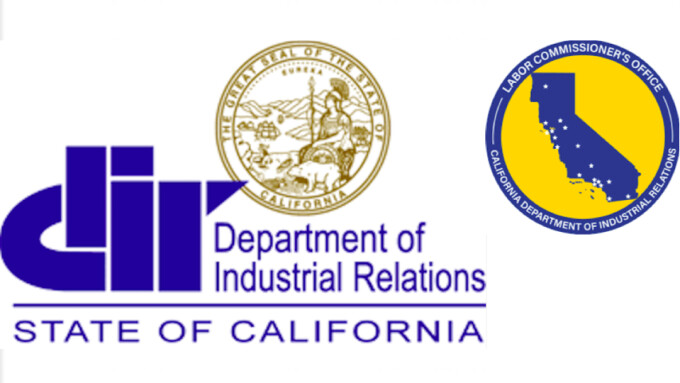LOS ANGELES — The California Labor Commissioner awarded $5,418.15 in “unlawful fees” to Arietta Adams in a dispute with her former agency, Direct Models.
The decision was made public on Wednesday. Direct Models' attorney, Karen Tynan, told XBIZ that her client will appeal the decision through a “trial de novo” before the Superior Court, a similar strategy to that followed by the agency’s legal team after the Labor Commission ruled on a separate case involving five former clients known as “the Jane Does.”
One of the central points of contention between Adams and the agency was the charging of separate “booking fees” (besides the customary 15% commission paid by the model to the agency) to studios, which the model alleged was “related” to Direct Models procurement of employment on her behalf.
Arietta Adams signed a two-year contract with Direct Models on February 15, 2019. Starting on April 1, 2020, Direct Models initiated a Labor Commission action against Adams for “failing to pay proper commissions on jobs received in late 2020 and early 2021.” Adams immediately filed a cross-petition alleging that Direct Models had previously “violated the Talent Agencies Act by sending her into unsafe working conditions without reasonable inquiry” and that she had been charged “unlawful fees” and was entitled to be refunded for commissions.
Adams last performed on a Direct Models-booked shoot on January 29, 2020 and shortly after that there was a disagreement between Adams and Direct Models owner Derek Hay that resulted in the model’s lawyer sending a letter on March 9, 2020 stating that their contract “was no longer in effect due to breaches of the contract by Direct Models.”
Adams testified that she performed in several other shoots in the winter of 2020 and early 2021, during the term of her original contract, but did not pay commission to Direct Models for those shoots.
Disagreement Over 'Booking Fees'
Hay explained to the commission that the “booking fees” are for work “that Direct Models does on behalf of producers,” including “communication with the employer, casting director, producing director, et cetera; honing down an actor that is suitable to be cast in whatever production they are casting; confirming availability, confirming the rate fits within their budget, and confirming other details about that casting that the employer has, which may be certain sizes or skin tone or hair color or other things; general reliability to show up on set early; good attitude if on a long shooting day. It could be a myriad of other things, so it’s all of those things.”
The Labor Commission report also quotes Hay as noting that “the talent agency might have a general description of what studios are looking for, and the talent agency has to find an actor that matches that description.”
These booking fees, the report established, are not an explicit part of the agreement between the model and the agency, and are paid when Direct Models directly invoices employers — generally, the studios — and receives payment via check or direct payment applications.
The Labor Commission’s decision in this case sided with Adams in maintaining that “the booking fees were unlawful fees above the 15% commission to which Direct Models was entitled,” even though the fees were charged directly to the studio and not to the model.
Direct Models had claimed that “it did not violate its contract because the booking fees were completely separate fees for the work Direct Models performed for the agencies and thus unrelated to individual talent” and that “such fees are standard in the industry.”
The Labor Commission’s report dubbed the booking fees “backdoor charges” and noted that the agency “failed to include those amounts in their Schedule of Fees and collected an amount in excess of the Schedule of Fees.”
In a footnote, however, the Labor Commission’s attorney noted with some ambiguity that “because [Adams] did not challenge the lawfulness of these fees in general, but rather contended that the fees were not disclosed properly, we address only whether the fees were properly disclosed.”
Adams was awarded $3,700 in booking fees, adjusted to $4,843.42 with interest, plus other disputed fees, resulting in a judgement in her favor of $5,428.15.
The Labor Commission also found, however, that Adams had failed to prove a number of other allegations against Direct Models, including that the agency had booked her into unsafe shooting conditions.
The Attorneys Speak
Adams’ attorney, Joseph Salama, told XBIZ that in his opinion, ”the Labor Commissioner ruled that backdoor booking fees are not permitted because the agency fee is capped at 15%” and added that “any agent who is receiving these types of booking fees is at risk” of a similar action.
Direct Models' counsel, Karen Tynan, after confirming the "trial de novo" appeal, disagreed with Salama and contended that “there are nuances in [the Adams] decision that are important to point out" and that "the Labor Commissioner did not find the agency fees to be unlawful.”
“Any attorneys who say that the decision questions the lawfulness of agency fees paid by production companies is flat out wrong,” Tynan added. “The Labor Commissioner determined that Ms. Adams did not challenge the lawfulness of the agency fees. Ms. Adams contended that the fees were not disclosed properly. Disclosure of the production company payments was at issue.”
“The decision is clear, and no agencies should panic,” Tynan added.
Tynan also noted that “Labor Commissioner Raymond decided many issues in Direct Models favor: Direct Models did not violate any duty related to model safety or a safe working environment; working with [a specific producer named by Adams] was not unsafe; Direct Models did not breach any fiduciary duty to Ms. Adams; and [the Labor Commissioner found] no personal liability for the talent agency owner.”
As for one of the other fees awarded to Adams, Tynan said that “The Labor Commissioner[’s attorney, who wrote the report], like he did with the talent agency fees, did not determine whether a kill fee is lawful but instead determined that the kill fee must be properly disclosed.”
The trial de novo is a common appeals strategy in civil and small claim cases where one of the parties continues to fight a case after a ruling against them. The trial de novo request — “de novo” means “anew” in Latin — asks to set aside the decisions from a lower court, or in this case the proceedings of the Labor Commission, and retry the case.








